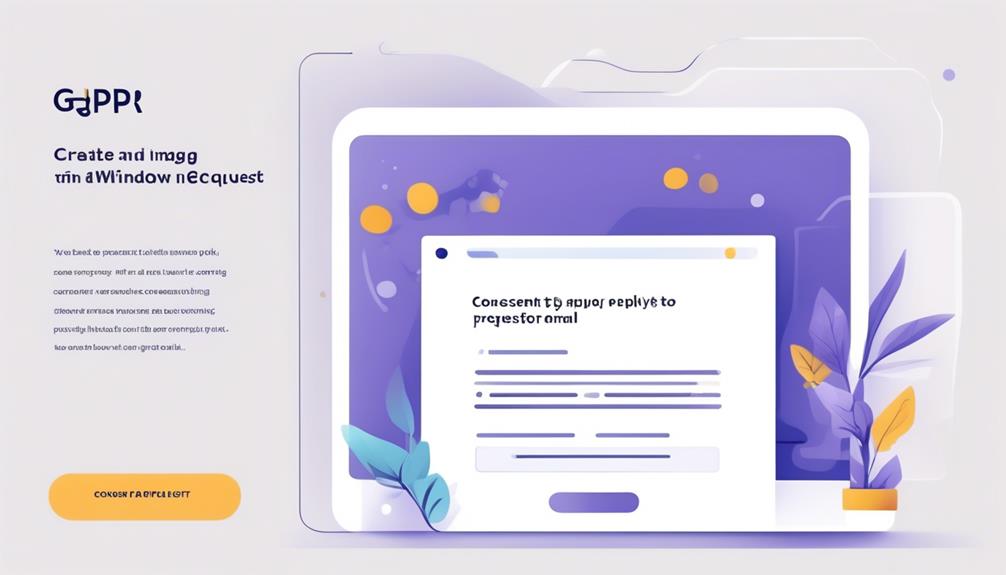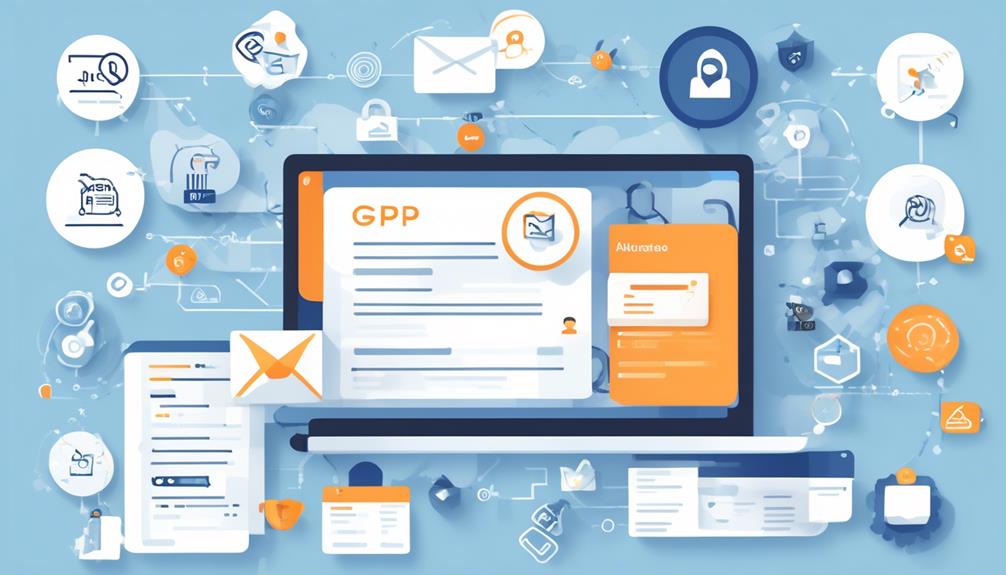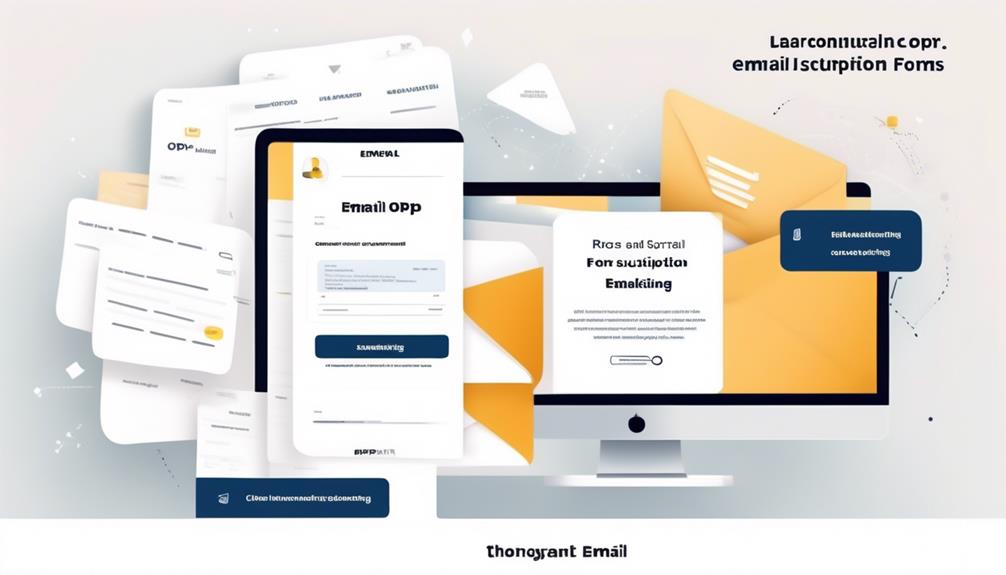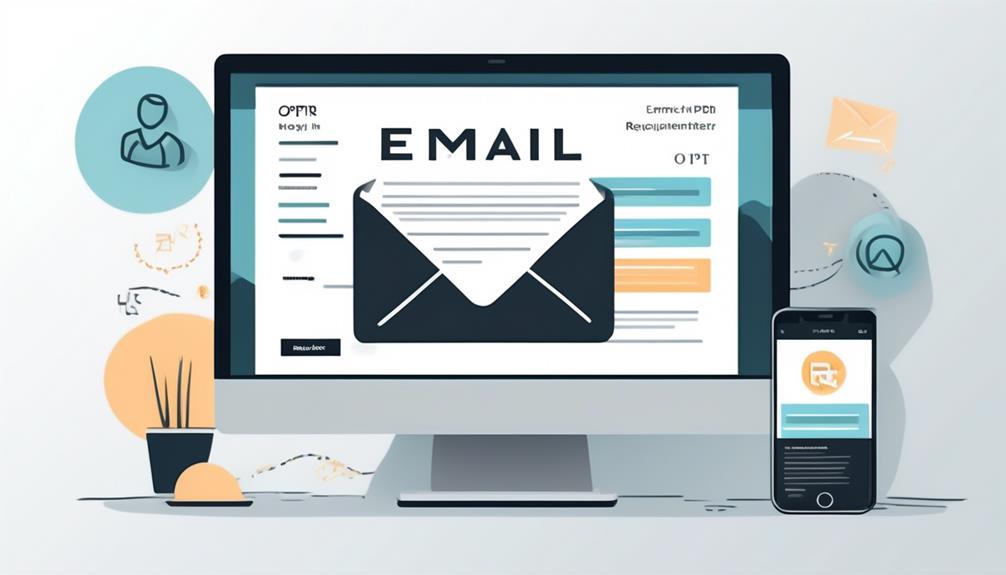Are you of the opinion that getting GDPR consent is just a bureaucratic hurdle for email marketing? Think again.
The truth is, GDPR consent is absolutely crucial for email marketing success in today's digital landscape. From protecting customer data to avoiding hefty fines, the implications of GDPR are far-reaching.
But why exactly is GDPR consent so vital for email marketing? Well, let's just say it's not something you want to overlook if you value your company's reputation and bottom line.
Key Takeaways
- GDPR consent ensures lawful, fair, and transparent use of personal data in email marketing.
- Obtaining explicit consent demonstrates respect for privacy and builds trust with the audience.
- Compliance with GDPR offers a competitive advantage and minimizes the risk of fines and legal implications.
- Double opt-in and robust data security measures help maintain GDPR compliance and protect personal data.
Importance of GDPR for Email Marketing
In our efforts to comply with GDPR regulations, we actively seek and obtain specific, informed, and unambiguous consent from individuals for the processing of their personal data in our email marketing campaigns. Under the Data Protection Regulation (GDPR), this consent is vital as it ensures the lawful, fair, and transparent use of people's data in email marketing. By obtaining explicit consent, we demonstrate our commitment to respecting the privacy and personal data of individuals. This not only aligns with legal requirements but also fosters trust with our audience.
The importance of GDPR consent for email marketing can't be overstated. It not only safeguards individuals' personal data but also enhances the integrity of our email marketing platform. With GDPR consent, we can confidently engage with our audience, knowing that we've obtained permission to process their personal data for marketing purposes.
Furthermore, GDPR compliance offers a competitive advantage by demonstrating our commitment to data protection and privacy. It also minimizes the risk of fines and legal implications, making it an essential aspect of our email marketing strategy.
Consent Requirements for Email Marketing

As we consider the consent requirements for email marketing under GDPR, it's crucial to understand the legal intricacies surrounding opt-in and opt-out processes.
Ensuring that consent is freely given, specific, informed, and unambiguous is essential for compliance.
Additionally, providing clear and easy opt-out mechanisms is a fundamental aspect of meeting GDPR's consent requirements for email marketing.
Legal Consent Requirements
How can businesses ensure that consent for email marketing meets the legal requirements set forth by GDPR?
GDPR consent for email marketing necessitates that consent must be freely given, specific, informed, and unambiguous. It should also be a clear indication of the individual's wishes through a statement or clear affirmative action.
GDPR requires the lawful, fair, and transparent use of people's personal data, including for email marketing purposes. This means that businesses must obtain and maintain documentary evidence of consent to demonstrate compliance with the GDPR consent requirements.
Furthermore, email service providers must ensure GDPR compliance for their clients to protect personal data.
Opt-In and Opt-Out
To ensure that email marketing activities align with the legal requirements of GDPR, businesses must carefully consider the opt-in and opt-out mechanisms as essential components of obtaining and maintaining valid consent.
When it comes to GDPR consent for email marketing, organizations should be aware of the following key points:
- Consent must be freely given, specific, informed, and unambiguous.
- Maintaining documentary evidence of consent is crucial, and clear opt-out options should be provided in every communication.
- Pre-ticked opt-in boxes and default options aren't valid forms of consent under GDPR.
- Email marketing strategies benefit from GDPR compliance by fostering increased customer trust and reducing legal risks.
Understanding and adhering to the opt-in and opt-out requirements of GDPR are fundamental to ensuring the lawful processing of personal data in email marketing and upholding data protection standards.
GDPR-Compliant Email Subscriber Lists
When it comes to GDPR-compliant email subscriber lists, there are several key points to consider.
First, organizations must ensure that they've obtained explicit, informed, and unambiguous consent from each individual on their list.
Second, it's crucial to adhere to data protection laws and maintain documentary evidence of consent to reduce liability in the event of a data breach.
Lastly, subscribers have rights under GDPR, and it's important to understand and respect these rights when managing email lists.
Consent Requirements
Ensuring GDPR-compliant email subscriber lists necessitates obtaining consent that's freely given, specific, informed, and unambiguous, as well as maintaining documented evidence of such consent in accordance with GDPR requirements.
When establishing consent for email marketing, organizations should consider the following:
- Freely Given: Consent must be given without pressure or negative consequences for refusal.
- Specific: It should be granular and related to the distinct purposes for processing personal data.
- Informed: Individuals must be aware of what they're consenting to, including the data controller's identity and the purposes of the processing.
- Unambiguous: Consent should be clear and require an affirmative action, such as opting in.
These requirements align with the GDPR's emphasis on explicit consent and the challenges of relying solely on legitimate interest for email marketing.
Compliance with these consent requirements is fundamental for maintaining a GDPR-compliant email retention policy.
Data Protection Laws
Maintaining GDPR-compliant email subscriber lists requires a thorough understanding of data protection laws and their implications for email security and privacy. GDPR mandates lawful, fair, and transparent processing of individuals' personal data, including for email marketing purposes. It's essential to obtain specific and informed consent from subscribers to receive marketing emails, as it serves as the lawful basis for processing their personal data. Encryption and pseudonymization are technical measures that can be employed to ensure email security and comply with GDPR. Additionally, organizations must align their email retention policies with GDPR's emphasis on data erasure and the right to be forgotten. Compliance with GDPR not only demonstrates respect for individuals' privacy rights but also provides a competitive advantage and instills trust among subscribers.
| Data Protection Laws | Implications |
|---|---|
| Lawful, fair, and transparent use of personal data | Required for email marketing |
| Encryption and pseudonymization | Technical measures for email security |
| Email retention policies | Alignment with GDPR's data erasure emphasis |
Subscriber Rights
To ensure GDPR compliance for email marketing activities, organizations must prioritize the protection of subscribers' rights within their email subscriber lists. When managing email subscriber lists, it's crucial to be mindful of the following subscriber rights under GDPR:
- Right to Erasure: Individuals have the right to request the deletion of their personal data from email subscriber lists, and organizations must comply with such requests.
- Email Retention Policies: Companies must regularly review and update their email retention policies to minimize liability in the event of a data breach, aligning with GDPR requirements.
- Specific Consent: GDPR mandates that organizations obtain explicit and informed consent from subscribers before sending marketing emails, ensuring the protection of personal data.
- Legal Consultation: Seeking legal counsel is advisable to comprehend the specific GDPR implications and establish appropriate policies for email marketing activities.
Adhering to these subscriber rights is essential for maintaining GDPR-compliant email subscriber lists.
Opt-in and Opt-out Processes

Implementing robust opt-in and opt-out processes is essential for ensuring GDPR compliance in email marketing. Under the GDPR, obtaining valid consent for processing personal data is a fundamental requirement, and this extends to email marketing activities.
Opt-in processes necessitate that individuals explicitly and affirmatively consent to receiving marketing emails, meaning no pre-ticked boxes or assumed consent. This consent should be freely given, specific, informed, and unambiguous, with individuals fully understanding what they're agreeing to.
Additionally, companies must provide a clear and easily accessible opt-out method in every marketing communication, allowing recipients to withdraw their consent at any time. This means including an unsubscribe link or similar mechanism that promptly stops further marketing emails.
Failing to adhere to these opt-in and opt-out principles can result in non-compliance with the GDPR, potentially leading to severe penalties. Therefore, it's imperative for organizations engaged in email marketing to prioritize the implementation of effective opt-in and opt-out processes to ensure GDPR consent and compliance.
Double Opt-in Best Practices

When it comes to double opt-in best practices, it's crucial to emphasize the importance of a thorough verification process. We need to ensure that users confirm their consent not just once, but twice, to guarantee explicit agreement.
Additionally, we must explore various opt-in confirmation methods to find the most effective approach for obtaining and documenting consent.
Verification Process Importance
Ensuring explicit and informed consent for email marketing is crucial. The verification process, specifically employing double opt-in best practices, plays a significant role in validating the accuracy and authenticity of email addresses while reducing the risk of spam and fake accounts.
When it comes to the verification process, double opt-in best practices are essential for email marketing under GDPR. Here's why:
- Enhanced Data Security: Implementing a double opt-in process can enhance data security and minimize the chances of unauthorized access to personal information.
- Compliance with GDPR: Double opt-in verification is an effective way to maintain documented evidence of consent in compliance with GDPR requirements.
- Higher Quality Leads: Utilizing a double opt-in approach in email marketing can lead to higher quality leads and more engaged subscribers.
- Reduced Risk: Double opt-in best practices help to validate the accuracy and authenticity of email addresses and reduce the risk of spam and fake accounts.
User Confirmation Necessity
Confirming user consent through a double opt-in process is essential for ensuring compliance with GDPR regulations and maintaining high-quality engagement in email marketing. By requiring subscribers to confirm their interest in receiving communications, the double opt-in method ensures explicit and verified consent, aligning with GDPR's requirement for specific, informed, and unambiguous consent.
This process also helps in confirming the accuracy of contact information, reducing the risk of spam complaints, and providing documented evidence of consent, which is crucial for GDPR compliance in email marketing.
Implementing double opt-in best practices not only enhances data accuracy but also improves engagement while reducing the risk of legal issues related to consent.
Opt-In Confirmation Methods
Moving from the discussion of user confirmation necessity, we now turn our attention to the effective implementation of opt-in confirmation methods, specifically focusing on double opt-in best practices.
- Explicit Consent: Double opt-in ensures that subscribers provide affirmative opt-in, meeting the lawful bases for processing personal data under GDPR.
- Compliance Assurance: It helps in demonstrating GDPR consent for email marketing and strengthens data protection measures.
- Risk Mitigation: By confirming subscribers' genuine interest, it reduces the risk of sending unsolicited emails, aligning with GDPR requirements.
- Trust Building: Implementing double opt-in can enhance trust with subscribers, leading to better engagement and reducing the likelihood of regulatory fines.
Implementing double opt-in not only ensures compliance with GDPR consent requirements but also fosters a transparent and trustworthy relationship with subscribers.
Data Protection and Email Marketing

We must ensure that our email marketing practices adhere to the GDPR requirement of obtaining freely given, specific, informed, and unambiguous consent from individuals for the use of their data. Data protection is a crucial aspect of email marketing under GDPR. It's imperative to handle personal data, including email addresses, with utmost care and in compliance with GDPR regulations.
Ensuring that consent is obtained in a lawful, fair, and transparent manner is essential for email marketing activities. This involves clearly communicating the purposes for which the data will be used and obtaining explicit consent from individuals for each specific use. Additionally, maintaining documentary evidence of consent is necessary to demonstrate compliance with GDPR requirements.
It's also important to utilize secure and encrypted email services provided by reputable email service providers to safeguard the personal data collected for marketing purposes. Seeking legal advice from a qualified attorney can further ensure a comprehensive understanding of the specific GDPR implications for email marketing and help in developing robust data protection practices.
Role of Email Automation in GDPR Compliance

Email automation plays a crucial role in ensuring GDPR compliance for managing and documenting consent in email marketing campaigns. Utilizing email automation tools is essential for GDPR compliance, as they help in obtaining and tracking explicit consent for sending marketing emails, as required by GDPR.
Here's how email automation contributes to GDPR compliance:
- Facilitating Consent Management: Automation tools streamline the process of obtaining explicit consent from individuals, ensuring that the necessary permissions are in place before sending marketing emails.
- Managing Preferences: Email automation allows for accurate and up-to-date management of individuals' preferences and opt-in/opt-out choices for marketing communications, helping to ensure compliance with GDPR requirements.
- Record-Keeping and Accountability: Automation platforms assist in maintaining records of consent and data processing activities, demonstrating accountability and compliance with GDPR regulations.
- Risk Mitigation: Utilizing email automation for GDPR compliance helps minimize legal risks and ensures that marketing practices align with the principles of data protection and transparency.
Email Retention Guidelines

We need to consider retention time limits, data security measures, and user consent documentation when discussing email retention guidelines.
Establishing clear retention time limits ensures that personal data isn't stored for longer than necessary, reducing the risk of data breaches and ensuring compliance with GDPR.
Implementing robust data security measures and maintaining comprehensive user consent documentation are crucial components of effective email retention practices under GDPR.
Retention Time Limits
When considering retention time limits for email data, it's crucial to ensure compliance with GDPR guidelines by not storing personal data longer than necessary for its intended purpose. Adhering to retention time limits is essential for data protection and to reduce liability.
Here are some key considerations:
- Regularly review and update email retention policies to align with GDPR requirements.
- Automate and simplify email data erasure processes to comply with GDPR guidelines.
- Consider utilizing email services that offer expiring email options to facilitate data deletion and meet GDPR requirements.
- Avoid retaining unnecessary emails in inboxes to minimize the amount of personal data held and potential liability.
Data Security Measures
Implementing robust encryption and pseudonymization measures is essential for ensuring the security of email data in compliance with GDPR requirements. These data security measures play a crucial role in safeguarding personal data within email marketing.
GDPR consent necessitates that email service providers adhere to data protection by design and default, ensuring secure and encrypted email services. It's imperative for organizations to align their email retention policies with GDPR's emphasis on data erasure and the right to be forgotten, thereby minimizing liability in the event of a data breach.
Compliance with GDPR is vital for email marketing, especially in the EU and UK, where the volume of daily emails exchanged is rising. As such, organizations must prioritize robust data security measures to protect personal data and uphold GDPR consent standards.
User Consent Documentation
User consent documentation for email retention guidelines is crucial for ensuring compliance with GDPR requirements and safeguarding personal data within email marketing. When it comes to user consent documentation, email providers must adhere to specific guidelines to maintain GDPR compliance and protect personal data.
Here are some key considerations for user consent documentation in email retention:
- Clearly outline the purpose of data collection and processing in the consent documentation.
- Provide users with the ability to easily withdraw their consent at any time.
- Maintain detailed records of user consent, including the time, date, and method of consent.
- Regularly review and update user consent documentation to reflect any changes in data processing practices.
GDPR's Impact on Segmentation and Targeting

How has the GDPR impacted the practices of segmentation and targeting for companies processing personal data?
The GDPR has significantly influenced the processes of segmentation and targeting by imposing strict requirements on the collection, storage, and usage of personal data. Under the GDPR, companies are obligated to have a lawful basis, such as obtaining explicit consent, for processing personal data for segmentation and targeting purposes.
Moreover, companies must ensure that they only collect necessary data and utilize it for compatible purposes, in line with the principles of data minimization and purpose limitation outlined in the GDPR.
Additionally, the GDPR mandates that clear and concise information regarding data collection and usage must be provided to customers, enhancing transparency and empowering individuals to make informed decisions about their data.
Furthermore, the GDPR has made companies more transparent and accountable in their segmentation and targeting practices, fostering a culture of data protection and privacy compliance.
As a result, companies have had to adapt their segmentation and targeting strategies to align with the stringent requirements of the GDPR, ensuring that their practices are in full compliance with the regulation.
Easing Opt-out Processes for Subscribers

We prioritize providing clear and straightforward opt-out mechanisms for subscribers to withdraw consent for receiving marketing emails. This is crucial for ensuring compliance with GDPR and the ePrivacy Directive.
To accomplish this, we implement a user-friendly process that allows subscribers to manage their email preferences and easily unsubscribe from marketing emails. Our approach includes:
- One-click Unsubscribe: We offer a one-click unsubscribe option in all marketing emails, streamlining the opt-out process for subscribers and making it hassle-free.
- Email Preference Management: Subscribers have the option to easily update their email preferences, including the frequency and types of communications they wish to receive. This empowers them to personalize their experience while maintaining control over their consent.
- Central Dashboard: We simplify the opt-out process by providing a central dashboard for subscribers to manage their email preferences and opt-out settings. This centralized approach enhances transparency and ease of use.
- Compliance Assurance: By prioritizing these opt-out processes, we ensure that our email marketing practices align with GDPR requirements, thereby fostering trust and transparency with our subscribers.
GDPR and Email Marketing Success

In striving for GDPR compliance and email marketing success, our company diligently ensures that explicit consent is obtained for all email communications, fostering transparency and trust with our customers. Under GDPR, obtaining explicit consent is crucial for the lawful processing of personal data in email marketing.
Compliance with GDPR not only builds trust with customers but also helps us avoid hefty penalties for violations. It's imperative for email marketing under GDPR to document consent, appoint a data security officer, and protect personal data from unauthorized access.
Best practices for email marketing under GDPR include using clear and affirmative consent, avoiding pre-checked boxes, and providing easy-to-use opt-out mechanisms. By adhering to GDPR requirements, our email marketing efforts lead to increased customer trust, accurate data, reduced legal risks, and higher conversion rates.
We understand that GDPR compliance isn't only a legal obligation but also a means to achieve email marketing success through ethical and transparent practices.
Ensuring GDPR Compliance for Email Campaigns

To ensure GDPR compliance for email campaigns, there are several key considerations:
- Obtaining Explicit Consent: Before sending marketing emails, it is necessary to obtain explicit consent from individuals in accordance with legal requirements.
- Clearly Stating Lawful Basis: When seeking consent for email marketing, it is crucial to clearly state the lawful basis for collecting and using personal data. This ensures compliance with the GDPR's principles of lawfulness, fairness, and transparency.
- Protecting Personal Data: It is essential to protect personal data from unauthorized access or destruction in accordance with GDPR requirements. This involves implementing robust security measures and data protection protocols to safeguard the information collected for email campaigns.
- Documenting Consent: Documenting consent is paramount for compliance. Keeping a record of when and how individuals provided consent adds a layer of accountability and transparency, demonstrating adherence to the GDPR's standards.
- Appointing a Data Protection Officer: Considering the complexity of GDPR compliance, appointing a data protection officer specifically for overseeing email marketing activities can further ensure alignment with the regulatory requirements.
- Utilizing Clear and Affirmative Consent Mechanisms: By using clear and affirmative consent mechanisms, such as avoiding pre-checked boxes and providing opt-out options, email marketers can establish GDPR-compliant practices that prioritize data protection and respect individuals' rights.
Legal Considerations for Email Marketing

Considering the extensive legal requirements for obtaining consent and safeguarding personal data in email marketing, it is imperative to address the specific legal considerations outlined by the GDPR. Ensuring compliance with GDPR involves understanding the legal implications of collecting, processing, and storing personal data for email marketing purposes. Below, we outline key legal considerations for email marketing under the GDPR:
| Legal Considerations | Description | Implication |
|---|---|---|
| Data Protection | GDPR requires organizations to consider data protection implications in all products and services. | Email marketing activities must align with GDPR's data protection principles, ensuring the lawful and fair processing of personal data. |
| Email Encryption | Email encryption is the most feasible option for GDPR compliance. | Organizations must implement robust email encryption measures to protect personal data transmitted via email. |
| Data Erasure and Rights | GDPR emphasizes data erasure and the right to be forgotten. | Email marketers must have processes in place to honor individuals' requests for data erasure and the right to be forgotten. |
| Service Provider Compliance | Email service providers must ensure GDPR compliance for their clients. | When using email service providers, organizations must verify that their providers adhere to GDPR requirements for data processing and storage. |
| Legal Consultation | Consultation with an attorney is recommended to understand specific GDPR implications. | Seeking legal advice can help ensure a comprehensive understanding of GDPR's legal requirements for email marketing activities. |
Understanding and addressing these legal considerations is crucial for ensuring GDPR compliance in email marketing, and organizations should prioritize these factors when developing their email marketing strategies.
GDPR's Influence on Marketing Automation

Understanding the impact of GDPR on marketing automation is essential for ensuring compliance with data protection regulations and safeguarding personal data. When it comes to marketing automation, GDPR has a significant influence, shaping the way organizations handle personal data in their email marketing efforts.
Here are some key aspects of GDPR's influence on marketing automation:
- Data Protection Implications: GDPR requires organizations to consider data protection implications in all products and services, including marketing automation. This means that data security and privacy must be integral parts of any marketing automation strategy.
- Technical Measures: Encryption and pseudonymization are examples of technical measures that can be employed to secure email data in marketing automation, aligning with GDPR requirements for data security and protection.
- Data Management: GDPR's emphasis on data erasure and the right to be forgotten impacts how email data is managed in marketing automation. Organizations need to ensure that they can effectively delete and manage personal data as required by GDPR.
- Consent Criteria: Consent for email marketing must meet GDPR's criteria of being freely given, specific, informed, and unambiguous. This means that organizations must ensure that the consent they obtain for email marketing meets these stringent requirements to comply with GDPR.
Future Outlook for GDPR in Email Marketing

The evolving landscape of data protection regulations necessitates a proactive approach in anticipating the implications of GDPR on email marketing practices. As we look to the future, it's crucial for email marketers to recognize the ongoing significance of GDPR consent in shaping their strategies.
The Regulation's requirement for explicit, informed, and unambiguous consent aligns with the broader trend towards heightened data protection and privacy standards. This means that email marketing efforts must prioritize transparency and respect for individuals' data privacy, ensuring that recipients have clear options to opt-out or unsubscribe from marketing communications.
Looking ahead, it's evident that GDPR compliance will continue to be a cornerstone of successful email marketing. Organizations that prioritize compliance not only mitigate the risk of reputational damage and financial penalties but also stand to gain competitive advantages.
Moreover, with the upcoming ePrivacy Regulation poised to introduce additional implications for email marketing, staying abreast of regulatory changes is paramount. By maintaining a proactive and adaptive approach, email marketers can navigate the evolving regulatory landscape, build trust with their audiences, and capitalize on the potential business opportunities that compliance with GDPR affords.
Frequently Asked Questions
How Does GDPR Impact Email Marketing?
GDPR significantly impacts email marketing by requiring explicit consent, data protection measures, and compliance documentation. It influences email retention and erasure processes, necessitating legal consultation for tailored compliance.
Non-compliance risks hefty fines and customer trust. We must ensure GDPR compliance, offering secure email services and understanding unique implications.
Our approach prioritizes consent, data protection, and legal expertise to maintain trust and avoid penalties.
Why Is GDPR Important in Marketing?
GDPR is important in marketing because it safeguards individuals' personal data and ensures ethical and lawful use. It builds trust with customers and protects our brand's reputation.
Compliance with GDPR regulations is vital to avoid hefty fines and maintain credibility. By prioritizing data protection, we demonstrate our commitment to customer privacy and security. This approach strengthens customer relationships and sets us apart as a responsible and trustworthy marketing entity.
What Is the GDPR Fine for Email Marketing?
We understand the concern about GDPR fines for email marketing. Non-compliance can lead to penalties of up to 4% of global revenue or €20 million.
It's essential to implement data protection measures, such as encryption, as required by GDPR. We must also adhere to data retention and erasure regulations to ensure compliance and avoid hefty fines.
Taking proactive steps in our email marketing practices is crucial for meeting GDPR requirements.
Why Does Direct Marketing by Email Require Consent?
Direct marketing by email requires consent under GDPR to ensure that individuals have control over their personal data. This consent must be explicit, informed, and unambiguous, as emphasized by GDPR.
It's crucial for organizations to maintain documentary evidence of consent for email marketing activities. Failure to comply with GDPR consent requirements can result in significant fines and reputational damage.
Therefore, obtaining valid consent is vital for email marketing under GDPR.
How Can GDPR Consent Impact Email Marketing Strategies?
When crafting email marketing strategies, utilizing the best email marketing consent examples is crucial for GDPR compliance. Ensuring clear and unequivocal consent from subscribers is essential for maintaining trust and avoiding potential legal issues. Effectively obtaining and documenting consent can lead to higher engagement and better overall campaign performance.
Conclusion
In conclusion, GDPR consent serves as the protective shield for both businesses and customers in the realm of email marketing. It acts as the guardian of personal data, ensuring that it's respected, valued, and protected.
Just as a sturdy fortress defends its inhabitants from harm, GDPR consent safeguards individuals' privacy and maintains the integrity of marketing practices.
It's a symbol of trust, transparency, and accountability, shaping the future of ethical and compliant email marketing.









